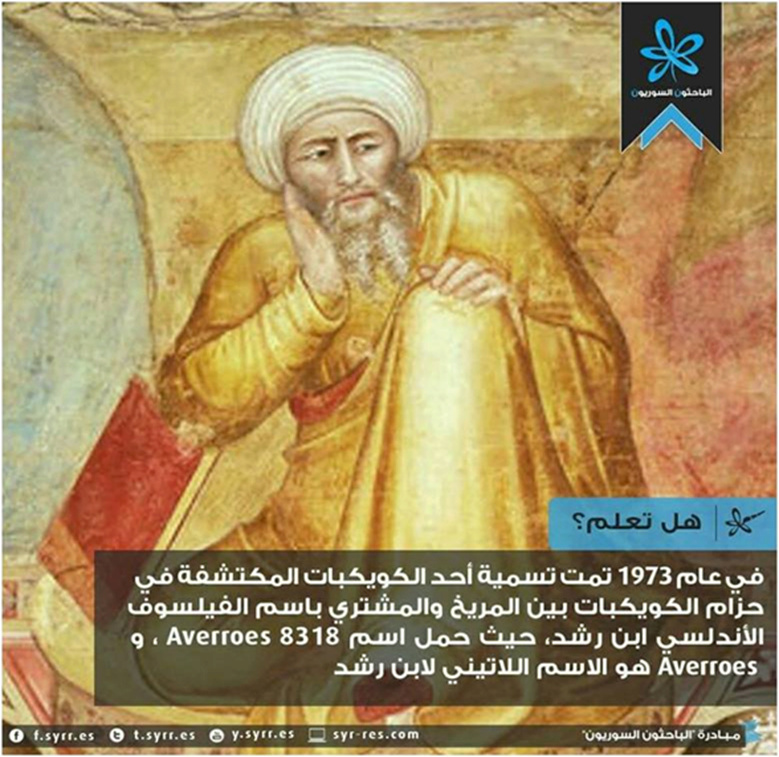Ibn Rochd and Andalusia

Ibn Rochd “the son of rectitude” was a jurist, physicist, astrologer, philosopher (hakim-sage), doctor, in the time of al-Andalous. In Spain where he was born, and in the West in general, Ibn Rochd al Qortobi is known by his Latinized name Averroes or “The Commentator”. He is admitted as “one of the fathers of Western philosophy” or even “the precursor of Western rationalist thought”. We know a lot about the thoughts and writings (his own writings in Arabic or retranslated) of Ibn Rochd, but little about him, his identity, his family. He was born on April 14, 1126 (520 AH) in Cordoba, died on December 10, 1198 (595 AH) in Marrakech. He was Spanish and his ancestors were probably Berbers, certainly not from the periphery of Nejd as Luis Borges strangely suggests in one of his short stories. (The Quest for Averroës. (in L’aleph). Jorge Luis Borges.
https://ahmedhanifi.com/la-quete-daverroes/)
“The lineage of Banû Rushd is known from the great-grandfather of our philosopher, Ahmad b. Ahmad b. Muhammad b. Ahmad b. ‘Abd Allah b. Rushd. This nasab (genealogy included in the nomination) indicates that the family had already been Muslim for at least three generations,” writes Urvoy. (Averroès, the ambitions of a Muslim intellectual. Dominique Urvoy. Ed. Flammarion/Champs biography, Paris, 2008_ 253 pp. Pages 18, 150,152.)
Note that all the Spanish philosophers of this period are called “Arabs” in reference to the language they used and not to their ethnic origin; most of them had Berber ancestry. Likewise, the Berber Almoravid (almorabitoun), Almohad (almowahhidoun), Zirid (ezziriyoun) dynasties, etc. are sometimes called “Arab”. At the beginning of the 12th century, the south of Spain and Portugal was under the domination of the Almoravids (1086-1147), then the Almohads (1147-1248), another Berber dynasty which would be driven out by the Nasrid, the last Muslim dynasty. in Spain (mid-12th to end of 15th century). The period known as the “golden age of Islam” (9th to 13th centuries) covered three continents. The scholars were not all Muslims, but Ibn Khaldoun wrote: "Among the greatest Muslim (philosophers), we will cite Abû-Nasr al-Fârâbî and Abû-'alî Ibn Sînâ (Avicenna) in the East, the cadi Abû-l -Walîd b. Rushd (Averroes) and the vizier Abû-Bakr b. as-Sâ’igh (or Ibn Bajja, or Avempace), in Spain.” (Discourse on Universal History – Al Muqaddima, Ibn Khaldûn. New translation, preface and notes by Vincent Monteil. Éditions Sindbad, Paris, 1978, T3, 1440 p. Pages 1047-1048.)
We can add other names which were famous like the oriental Al-Razi (Iran), al-Kindi (Iraq), Al-Ghazali (Iran) and the Western-Andalusian Ibn Tufayl, Ibn Arabi, Hafsa Rakumiyya, Wallada bint al mustakfi, Ibn Sab'în, Maimonides, who was not a Muslim. And others.
(to be continued)

__________________________________
Previous post: Day 1- Monday March 11, 2024
Ibn Rochd
“That divine Law invites a rational and in-depth study of the universe is what appears clearly in more than one verse of the Book of God (the Blessed, the Most High!). When he says for example: ''Learn from this, O you who are gifted with intelligence!'' (Quran LIX, 2), this is a formal statement showing that it is obligatory to use reasoning rational, or rational and religious at the same time. » 1- (Ibn Rochd (Averroès), “The agreement of religion and philosophy. Decisive treatise. Translated from Arabic by Léon Gauthier. Ed. Sindbad, Paris, 1988, 70 p. Page 12.)
“Man naturally has a passion for knowledge. » (Metaphysics, Aristotle. Book 1° - chapter 1°. Translation J.B. Saint-Hilaire. Librairie G. Baillière. 1879.)
___________
At the start of the month of Ramadan, we celebrate the birth, almost nine centuries ago, of Abû-l-Walid Mohammed bnou Ahmed bnu Rochd, one of the most illustrious Andalusian thinkers, whose name adorns the portals of many educational establishments in Algeria, but which disappears as soon as we pass through them. Who is Ibn Rochd? This is the purpose of this contribution. I will understand this scholar first by his identity, then by his career, his thoughts, his relationship to power, to the city where he lived, and will end up evoking some views on his work/his person, by men of his time or not.
Ibn Rochd and Andalusia
Source: websites

